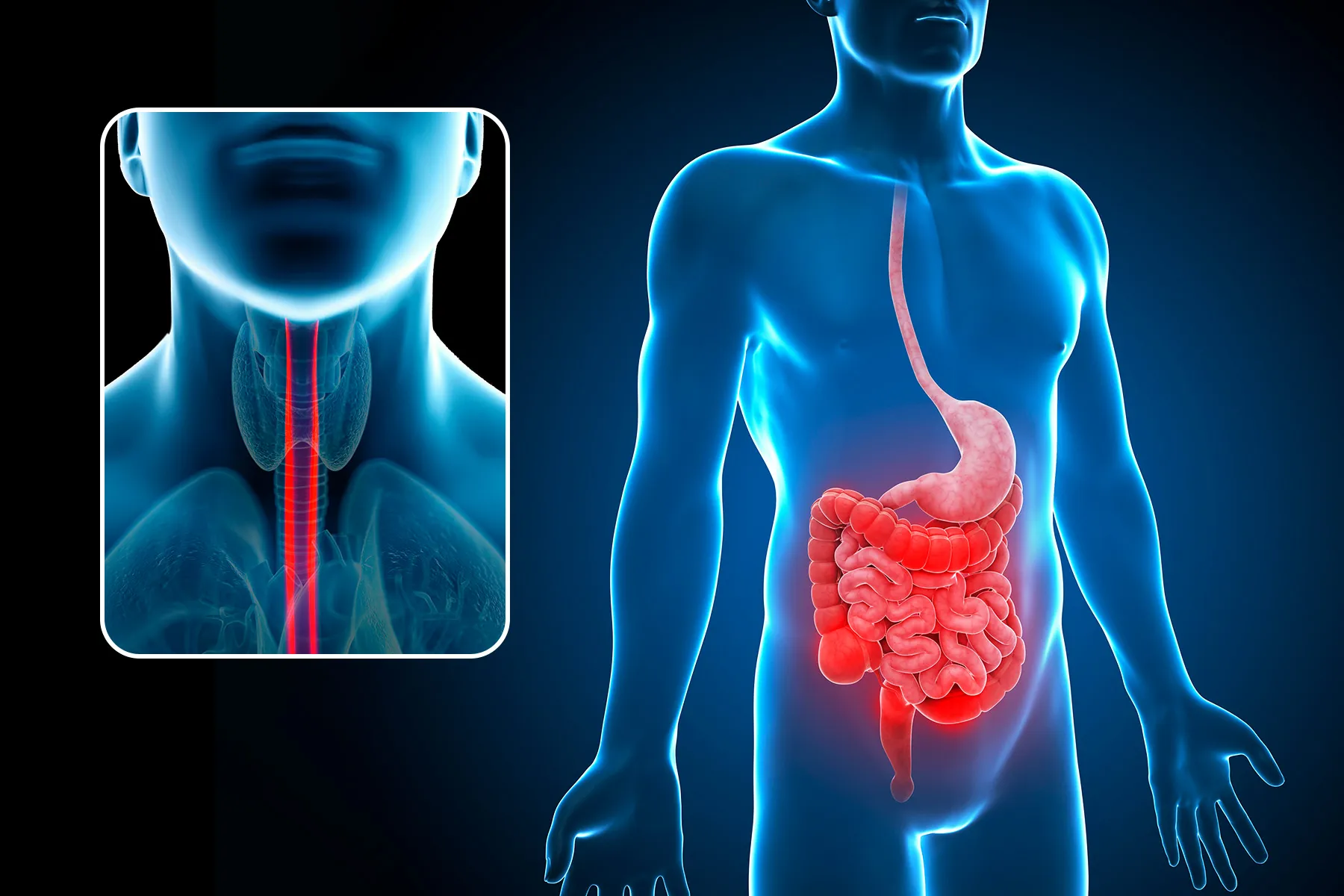Headaches linked to acid reflux may arise through the gut-brain connection. Management often involves lifestyle adjustments like avoiding trigger foods and weight control, along with over-the-counter and prescription medicines.

Gastric headaches refer to head pain that can accompany various gastrointestinal (GI) disorders.
It remains uncertain whether acid reflux directly causes headaches, or whether headaches can precipitate reflux.
Still, studies indicate a relationship between GI disorders and headaches mediated by the gut-brain axis — the communication network between the enteric nervous system in the gut and the central nervous system (brain and spinal cord).
Below are strategies for handling and preventing gastric headaches, along with possible causes.
Tips to manage acid reflux headaches
There’s no single definitive therapy for headaches that may be related to acid reflux.
However, certain lifestyle practices and OTC remedies used to control reflux might also ease headache symptoms.
Try OTC headache medication
Acetaminophen (Tylenol) is an OTC option that can relieve headaches without aggravating your stomach.
Be sure to adhere to dosing guidelines to prevent adverse effects such as liver injury.
Try acid-controlling medication
Some OTC agents for heartburn and reflux include:
- antacids
- H2 receptor antagonists
- proton pump inhibitors (PPIs)
If these measures fail to control reflux and related headaches, a clinician might prescribe stronger versions of these drugs or specific migraine treatments.
Don’t recline after you dine
Remaining upright helps keep stomach acid down instead of allowing it to flow back into the esophagus.
Wait at least 3 hours after eating before lying down to reduce reflux and the chance of a headache.
Having smaller evening meals may also speed digestion and lessen reflux.
Reduce or avoid nicotine
Nicotine, from cigarettes or vaping, can relax the lower esophageal sphincter, enabling acid to move upward.
Evidence shows smoking or secondhand smoke exposure may also increase the duration and intensity of headaches.
If you use tobacco, consult a healthcare provider about quitting; they can help create a cessation plan to cut reflux and headaches.
Reduce or avoid alcohol
Alcohol consumption may trigger gastroesophageal reflux disease (GERD) symptoms like heartburn.
It can also provoke headaches, including hangover-related head pain onset.
Modify your diet
Certain foods and drinks can provoke GERD symptoms and reflux. These may include:
- alcohol and caffeinated beverages
- spicy, fried, or fatty foods
- some fruits and vegetables, such as cruciferous vegetables, citrus fruits, and tomatoes
If particular foods seem to set off symptoms, consider cutting back or eliminating them.
Elevate your upper body during sleep
Sleeping with an incline may improve nightly GERD symptoms.
This can be done with bed risers at the head of the bed, a foam wedge, or a firm elevated pillow.
See more strategies for preventing nocturnal acid reflux.
Maintain a healthy weight
Excess weight can separate the abdominal structures that help keep the lower esophageal sphincter closed, making it easier for the sphincter to open and reflux to occur.
Studies also indicate obesity is a risk factor for migraine.
If you are overweight and experience reflux and headaches, talk with a clinician about a realistic weight-loss plan to help improve symptoms.
Monitor your medications
Some prescription drugs may raise your risk of reflux, including:
- tricyclic antidepressants
- calcium channel blockers
- nonsteroidal anti-inflammatory drugs (NSAIDs), such as ibuprofen (Advil)
- benzodiazepines
- anticholinergics
- glucagon
- nitroglycerin
Discuss with your healthcare provider if you suspect a medication is causing reflux and headaches; they may adjust your therapy to reduce these effects.
Migraine treatments and acid reflux
Certain drugs used for migraine relief can themselves cause reflux.
For instance, NSAIDs often relieve migraines but can irritate the stomach and provoke reflux.
What are the possible causes of headaches from acid reflux?
Multiple GI disorders have been linked to headaches, including:
- GERD
- dyspepsia
- irritable bowel syndrome (IBS)
- inflammatory bowel disease (IBD)
- peptic ulcer disease
A 2023 review also reported a notable association between H. pylori infection and headaches.
Some investigators propose the gut-brain axis plays a role in how reflux might lead to head pain.
Nevertheless, researchers agree that further studies are required to pinpoint the exact mechanisms behind reflux-related headaches.
What does the research say?
Evidence connecting headaches and acid reflux is still limited.
A 2022 study found individuals with a GI disorder were 3.5 times more likely to experience migraine compared with those without GI issues; among those with GI conditions, GERD was most commonly associated with headaches.
Likewise, a 2017 study identified GERD as the most frequent GI disorder among people with migraine.
A 2022 study in children and adolescents (ages 6–17) found a strong link between acid reflux and primary headaches — those that occur without an external cause like injury or disease.
Despite growing evidence of the GI–headache connection, more research is necessary to develop targeted treatments for gastric headaches.
Frequently asked questions
Can acid reflux give you a headache?
Acid reflux may be associated with headaches through the gut-brain axis, but additional research is needed to clarify the relationship.
How do you treat acidity-induced headaches?
Lifestyle measures such as quitting smoking, avoiding trigger foods, and limiting alcohol can help manage headaches possibly caused by reflux. OTC and prescription treatments may also be effective.
Can acid reflux cause back pain and headache?
In some cases, acid reflux can produce back pain as well.
Takeaway
Several studies indicate a connection between acid reflux and headaches.
GI disorders such as IBS, GERD, and dyspepsia can present with both reflux and head pain.
For many people, lifestyle changes and OTC remedies may relieve reflux and headaches; if these measures fall short, a healthcare provider can prescribe more targeted therapies.

























Leave a Reply
You must be logged in to post a comment.